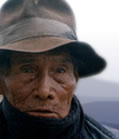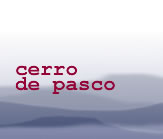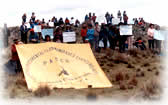 |
 |
||
 |
|||
|
RELATED THEMES economics environment health justice and crime land livestock politics OTHER LOCAL THEMES BACKGROUND |
compensation
Many narrators also relate stories of communities fighting for compensation for both land bought up by the mining companies, and for farmland and livestock destroyed by the industrial pollution. But as several point out, such legal battles are expensive and sometimes beyond community resources: ".bit by bit we have to fight it out with the company...The pollution is getting worse, and they take advantage of the fact that there are less of us now - we're weaker. and we don't know much about law, and there isn't any money to get back what's ours by right" (Peru 10). One way the mining companies have sometimes offered to compensate communities is by relocating them elsewhere, but such a drastic upheaval was rarely welcome: ".if we accept the relocation of our community.we would lose the value of the community.These lands are the inheritance we've received from our ancestors, we don't want to lose them for anything. We want to recover from the pollution and preserve what is left of our customs. We're a working community, with a history, and this is what we want to leave our children" (Peru 4). quotes about compensation"Before, business was much more comfortable in every way. More.meat, milk. We had everything because we had enough animals. Recently, we've become poor because of the fumes from La Oroya, the mine, because the company throws out a lot of arsenic.Every year they pay us an amount for the fumes, but it's a pittance, it's not enough for all us comuneros. it won't compensate for the damage they've done to us. The vets who come, the agriculturists, [can] cure other types of illness of course, other things, but they don't have anything for the illness [the animals get] from the fumes." "There are accidents all the time in the mine. My husband was the victim of negligence. The day my husband died there were several accidents and two deaths, one of them him.[Compensation was] a pittance: 300 soles (approx US$150). That's all, and a tiny pension. That's what the company pays for those who die working for them." "[Rancas] is the only community that has received compensation.Yes, the company responsible for the pollution, in this case, Centromin Peru, has contaminated as much 100, 282 hectares. Over 141 hectares are almost useless [as pasture]. There's a possibility they might be usable again but it is going to take 100 years to eradicate [the effects of] the pollution. Peru Centromin have paid $1,150,000 in compensation and a company, what we call the communal company, has been set up with the money. It has now got a number of things, heavy machinery..." "Sometimes it requires a lot of money to come up against Centromin and often the community doesn't have these kinds of economic resources and so we've been paralysed. We've sent representatives to the government, when members of parliament have come here we've spoken to them as well, but they don't do anything to help the communities. It's as if we don't exist and the Centromin company, since it belongs to the government, can do what it wants. We even won a court case against Centromin and they were forced to repay us [by building] a stadium, they built us a dairy [too] and a park. Officially we've won twice against Centromin." "The compensation that we got was tiny in comparison with what our leaders had requested. We must have got about 30 Soles to give to each member who had lost his harvest, everything, nearly his whole life. Do you think 30 Soles is worth that? There were 50 of them and they had to give to each one, so it wasn't enough for a whole year and we had to go off in search of work and a way to educate our children. This is what happened to us." "Well, right back before Volcan began to work [here], they took land from our community for their mining camps. They told us in an agreement that they'd do something for the village as compensation. They signed a document but the company hasn't fulfilled its promise. They took the land that they wanted, claiming that it had already been acquired by the Ministry of Energy and Mines, that this land belonged to the government and that we had nothing to do with it - that's what they said. Well, we had the titles for it and some time later we got it back." "Well, in those times, as far as I can remember, they used the following [compensation] method: since the animals died because of the fumes, the person in charge. a mayordomo [foreman] of the company.would come along and count the hides of the sheep and pay the proprietor directly. In addition to this, [the company] compensated the whole community for the general damage to the grazing land and the area affected. [How much for each animal?] Something like 15 cents.It was very little." |
|
 Narrators talk of three main areas of compensation: for land "swallowed up" by mining infrastructure; for the effects of pollution on their land; and for mining accidents and/or occupational health problems. For, while farming in the Central Andes is undoubtedly a tough occupation, mining brought new dangers and risks. Apart from death or injury caused by accidents, it seems many workers suffered poor health, sometimes permanently, as a result of taking a mining job: skin problems, including cancer, and lung disease are most often mentioned. As one miner's widow says:
Narrators talk of three main areas of compensation: for land "swallowed up" by mining infrastructure; for the effects of pollution on their land; and for mining accidents and/or occupational health problems. For, while farming in the Central Andes is undoubtedly a tough occupation, mining brought new dangers and risks. Apart from death or injury caused by accidents, it seems many workers suffered poor health, sometimes permanently, as a result of taking a mining job: skin problems, including cancer, and lung disease are most often mentioned. As one miner's widow says: